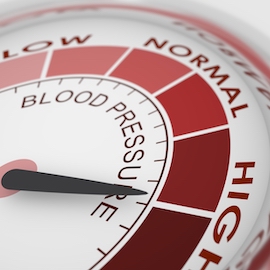
High blood pressure is often referred to as the “Silent Killer” because it typically has no outward or obvious symptoms and is one of the leading causes of stroke and heart disease among Americans. It is estimated that 1 in 3 adults (approximately 75 million) have high blood pressure. Periodic blood pressure checks are the only way to diagnose the disease.
What is high blood pressure?
The medical term for high blood pressure is hypertension. The Mayo Clinic defines hypertension as: “A long term condition in which the force of the blood against your artery walls is high enough that it may eventually cause problems, such as heart disease. Blood pressure is determined both by the amount of blood your heart pumps and the amount of resistance to blood flow in your arteries. The more blood your heart pumps and the narrower the arteries, the higher the blood pressure.”
Checking and understanding your blood pressure.
Blood pressure is routinely checked almost every time you enter a medical environment. It is painlessly checked using an automated, pressurized cuff. There are also a number of affordable and reliable devices that allow blood pressure to be monitored at home.
Blood pressure is expressed with two numbers representing the systolic and diastolic pressures in the blood vessels. The first (or top) number is systolic. It is the pressure exerted on the arteries when your heart beats. The second (or bottom) number is the diastolic pressure, which is the pressure on the artery walls when the heart is at rest between beats.
Once the blood pressure is taken, it will fall into one of the five categories recognized by the American Heart Association
Causes of high blood pressure.
There are several possible factors that can contribute to high blood pressure, and not all of them are within our control:
• Lack of physical activity. Exercise is critical in helping to maintain a healthy blood pressure. A heart that is strengthened through exercise has to work less to pump blood through your arteries.
• Obesity. Being overweight is stressful on the heart. Maintaining a proper weight is one of the most important factors in controlling high blood pressure. According to The American Heart Association’s 61st Annual Fall Conference of the Council for High Blood Pressure Research, “As many as 50 percent of overweight men and women with high blood pressure may have hypertension as a result of being overweight.”
• Smoking. While smoking does not directly cause high blood pressure, it does cause narrowing of the arteries which exacerbates hypertension long term, and introduces chemicals into the bloodstream which raise blood pressure temporarily. Smoking is also a large factor in heart disease.
• Sodium. While a small amount is necessary in the human body, most Americans are consuming far too much sodium. 70% of our sodium intake comes not from table salt, but from processed and restaurant foods. Controlling sodium intake is a key factor in reducing blood pressure. According to the 2015 – 2020 Dietary Guidelines for Americans, sodium intake should be 2,300 milligrams per day or less.
• Age. As we get older, our blood pressure tends to rise. 80% of Americans over 65 have high blood pressure.
• Genetics and race. Hypertension often runs in families and can be passed on from one generation to the next. Knowing your family medical history can help you determine if you’re predisposed to high blood pressure. Race also plays a factor. African-Americans are diagnosed with hypertension at an earlier age and in greater numbers than other ethnic groups.
• Sleep apnea. New studies are beginning to provide a link between sleep apnea (the chronic temporary stoppage of breathing during sleep) and hypertension.
• Birth control / pregnancy. Women who are using birth control can be susceptible to hypertension, and women who are pregnant can develop gestational hypertension (high blood pressure that develops after the 20th week of pregnancy).
Treatments for high blood pressure.
Although blood pressure is a serious condition, there are a number of options used to control it. Often changes in lifestyle are enough to lower blood pressure to healthy levels, but at times medication is necessary to adequately control hypertension.
Lifestyle changes.
• Quitting smoking. Not smoking will increase overall health in general, and slow the progress of Atherosclerosis (narrowing of the arteries) and heart disease.
• Weight loss. Losing weight is one of the most effective ways to reduce blood pressure without medication
• Exercise. In addition to helping to control weight and reduce stress, exercise promotes a strong and healthy heart, which can lower blood pressure.
• Diet. Counting calories and watching portion sizes will help control weight. Monitoring Sodium intake (2,300 milligrams or less per day) is important in managing blood pressure. A heart-healthy diet rich in fruits and vegetables that avoids processed foods and fast food will be effective in lowering blood pressure.
• Alcohol. If you have high blood pressure, avoid alcoholic beverages or use alcohol in moderation. Two drinks a day for men under 65, one drink a day for men over 65, and one drink a day for women would be considered moderate alcohol consumption.
Blood pressure medications.
There are times when lifestyle changes are simply not enough to help you meet your blood pressure goals. Age, family history, and genetics can make controlling hypertension problematic without the use of one or more high blood pressure medications. Your doctor will have upwards of 500 different medications available to them to help get hypertension under control. Coupled with a healthy lifestyle, blood pressure medications are highly successful in controlling hypertension. High blood pressure is a common problem all too often overlooked and is a serious condition, especially as we age. With appropriate lifestyle changes and possibly the use of medications, hypertension can oftentimes be successfully controlled.

